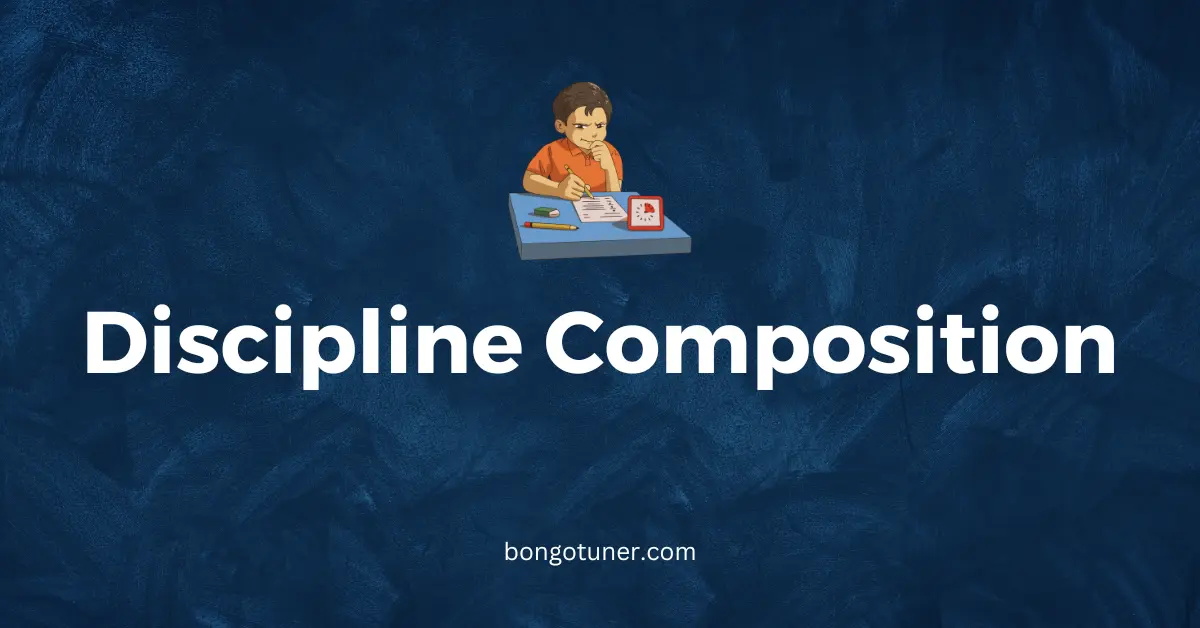Discipline composition is the arrangement and organization of different components in a disciplined manner, ensuring coherence and structure. It is essential for creating a harmonious and well-crafted piece of work that effectively communicates the intended message to the audience.
The process involves arranging elements such as text, images, and design elements in a way that is visually appealing and easy to follow. By carefully considering the layout and structure of the composition, the creator can enhance the overall impact of the work and engage the audience more effectively.
We will explore the importance of discipline composition in various forms of content creation and how it contributes to the success of a piece of work.
The Importance Of Discipline In Composition
Writing requires discipline to produce high-quality content consistently. It plays a crucial role in creating engaging compositions that resonate with readers.
Creat(ing) A Structured Writing Process
Establish a clear writing process with defined steps for ideation, drafting, editing, and finalization.
Develop(ing) Consistent Writing Habits
Cultivate regular writing habits by setting aside dedicated time each day to work on your compositions.

Credit: www.everylearnereverywhere.org
Understanding The Role Of Discipline In Writing
Understanding the importance of discipline in writing is crucial for effective composition. It helps writers stay focused, organized, and committed to producing quality content. By incorporating discipline, writers can maintain consistency and improve their overall writing skills.
Maintaining discipline in writing plays a crucial role in the overall quality of the content produced. Discipline helps writers stay focused and organized, leading to clearer and more coherent pieces.
How Discipline Enhances Clarity And Coherence
Discipline in writing ensures that thoughts are structured logically, resulting in cohesive and easy-to-follow content. Writers who exercise discipline are less likely to veer off topic, leading to clearer and more concise writing.
The Relationship Between Discipline And Productivity
Disciplined writing habits directly correlate with increased productivity, as writers are able to consistently work towards their goals without distractions. Maintaining discipline in writing leads to efficient use of time and resources, ultimately boosting overall output.
Practical Strategies To Enhance Discipline In Composition
Setting Clear Writing Goals
Establishing clear writing goals is essential for maintaining discipline in composition. By setting specific and measurable objectives, writers can focus their efforts and stay on track. It also provides a sense of accomplishment when goals are achieved. Breaking down larger writing projects into smaller, manageable tasks helps to maintain momentum and motivation.
Establishing A Writing Schedule
Developing a consistent writing schedule is crucial for discipline in composition. By allocating dedicated time for writing each day, writers can build a routine and train their minds to be productive during those times. This regularity helps to prevent procrastination and ensures steady progress on writing projects.
Implementing Time Management Techniques
Effective time management is key for maintaining discipline in writing. Utilizing techniques such as the Pomodoro method can help writers stay focused and productive during designated writing sessions. Additionally, creating a prioritized task list and allocating specific time blocks for different writing activities can enhance efficiency and organization.
The Impact Of Discipline On Creative Expression
The impact of discipline on creative expression is profound, as it allows for structure and focus, enhancing the ability to effectively convey ideas and emotions through composition. This discipline fosters creativity and helps in creating impactful and thought-provoking works.
The Impact of Discipline on Creative Expression
Balancing Discipline And Creativity
Discipline and creativity may seem like polar opposites, but in reality, they go hand in hand. Balancing discipline and creativity is essential for harnessing one’s full potential as a creative individual. While creativity allows freedom of ideas and exploration, discipline provides structure, focus, and direction to those ideas.
When it comes to discipline, it is important to have a routine and set aside dedicated time for your creative pursuits. Having a regular schedule helps to cultivate a habit of creativity and prevents procrastination. It is easier to tap into your creative side when you know you have set aside specific time for it.
Additionally, discipline plays a crucial role in setting goals and working towards them. By setting specific, achievable goals, you can channel your creative energy in a focused manner. This not only helps you stay motivated but also provides a sense of accomplishment when you reach those goals.
Overcoming Writer’s Block Through Discipline
One of the biggest challenges for creative individuals, specifically writers, is facing writer’s block. This dreaded phase can leave you feeling frustrated and depleted of ideas. However, discipline can be a powerful tool in overcoming writer’s block.
When faced with a creative block, setting a consistent writing schedule can help break through the barrier. By committing to write every day or at specific times, you train your brain to associate those moments with creativity. Eventually, this practice can help overcome writer’s block and spark inspiration.
Utilizing discipline in your writing process also involves setting aside time for research and brainstorming. Immersing yourself in different sources and ideas can fuel your imagination and lead to more creative and original content.
In addition to establishing a routine and engaging in research, discipline helps build resilience. The creative journey is often filled with rejection, doubt, and setbacks. However, discipline ensures that you keep pushing forward, learning from failures, and adapting your approach. It instills a sense of determination and encourages you to keep experimenting and exploring new avenues.
In conclusion, discipline and creativity are not mutually exclusive. Rather, they are complementary forces that enhance each other. By striking a balance between discipline and creativity, you can unlock your full creative potential and achieve greater artistic expression.
Fostering Discipline In Collaborative Writing Environments
When it comes to collaborative writing, fostering discipline is crucial for ensuring productivity and maintaining a high level of quality in the content produced. In a collaborative writing environment, effective communication and accountability are essential factors that contribute to the success of the team. By leveraging discipline, teams can enhance their productivity and create a cohesive workflow. Let’s explore how these aspects can be nurtured to foster discipline in collaborative writing environments.
Effective Communication And Accountability
Effective communication plays a vital role in maintaining discipline within a collaborative writing team. When team members communicate clearly and actively, they ensure that everyone is on the same page and understands their roles and responsibilities. This can be achieved by:
- Setting clear expectations and goals for the team
- Establishing open channels of communication
- Encouraging regular updates and feedback
- Using project management tools to facilitate communication
Accountability is equally important in fostering discipline. When team members are accountable for their work, they take ownership of their responsibilities and strive to meet deadlines. Here are some ways to promote accountability in collaborative writing environments:
- Assigning clear roles and responsibilities to each team member
- Establishing deadlines and holding members accountable for meeting them
- Encouraging transparency and honesty in reporting progress
- Providing regular feedback and constructive criticism
Leveraging Discipline For Team Productivity
Leveraging discipline in a collaborative writing environment is essential for maintaining high levels of productivity. When teams embrace discipline, they can effectively manage their time, resources, and tasks. Here are some strategies to leverage discipline for enhanced team productivity:
- Setting clear goals and priorities: Start each project with a well-defined set of goals and establish priorities to ensure that the team remains focused on what matters most. This will help in avoiding distractions and staying on track.
- Creating a structured workflow: Establish a clear workflow with predefined stages, deadlines, and milestones. This will help in organizing tasks and ensuring that each team member knows what needs to be done at every step.
- Eliminating distractions: Encourage team members to minimize distractions and create a conducive work environment. This may include limiting access to social media or implementing tools that block distracting websites during work hours.
- Regular progress monitoring: Implement regular check-ins and progress meetings to monitor the team’s progress and address any challenges or roadblocks. This will help in identifying and resolving issues promptly.
By fostering discipline through effective communication, accountability, and leveraging it for team productivity, collaborative writing environments can thrive. When teams work with discipline, they are more likely to produce high-quality content consistently and achieve their desired outcomes.

Credit: www.studypool.com
Cultivating Discipline In Revision And Editing Processes
When it comes to the process of revising and editing, cultivating discipline is essential for producing high-quality and polished content. Discipline in the revision and editing processes is crucial in ensuring that the final product is clear, precise, and well-crafted. In this article, we will explore the role of discipline in the revision and editing processes, as well as strategies for adhering to deadlines and maintaining focus throughout the revision and editing stages.
The Role Of Discipline In Revising For Clarity And Precision
Revision is a critical stage in the writing process, where content is refined and polished to ensure clarity and precision. Cultivating discipline during the revision process involves adhering to a structured approach and maintaining focus. By setting specific goals for revising content, writers can effectively identify areas that require improvement and apply disciplined techniques to enhance clarity and precision. Discipline in revising also involves the ability to step back from the content and critically evaluate it, ensuring that each sentence, paragraph, and section contributes meaningfully to the overall message.
Adhering To Editing Deadlines
Meeting editing deadlines is crucial in ensuring that the final content is delivered on time and aligns with project timelines. Maintaining discipline when adhering to editing deadlines involves effective time management, prioritization, and a proactive approach to addressing any potential challenges or obstacles that may impede progress. By implementing a structured schedule and allocating specific time for editing tasks, writers can cultivate discipline in the editing process, ensuring that the final product is thoroughly reviewed and refined within the designated timeframe.
Overcoming Challenges And Resisting Temptations
Distractions are inevitable, but prioritizing tasks can help maintain focus.
Set specific goals for each day to limit distractions and stay on track.
Creating a dedicated workspace can also minimize outside disruptions.
Setbacks are part of the journey; learn from them and keep moving forward.
Stay positive and resilient when faced with challenges.
Seek support from mentors or peers to help overcome setbacks.

Credit: parlorpress.com
Maintaining Long-term Discipline In Composition
When maintaining long-term discipline in composition, it is crucial to celebrate milestones and progress along the way. By acknowledging achievements, writers can stay motivated and inspired to continue their writing journey.
Celebrating Milestones And Progress
Setting clear milestones in writing achievements helps in staying disciplined and focused on long-term goals.
Strategies For Sustaining Writing Discipline Over Time
- Establish a consistent writing schedule to integrate composition as a daily habit.
- Set specific goals for each writing session to maintain focus and progress.
- Utilize writing prompts or exercises to keep creativity flowing and prevent writer’s block.
- Join writing groups or partner up with other writers for accountability and support.
- Take breaks when needed to avoid burnout and maintain enthusiasm for writing.
Frequently Asked Questions On Discipline Composition
What Is Discipline Composition?
Discipline composition refers to the way in which different disciplines are combined or integrated to create a cohesive and comprehensive approach to problem-solving or research. It involves drawing on the knowledge, methods, and perspectives from multiple disciplines to gain a deeper understanding of complex issues.
Why Is Discipline Composition Important?
Discipline composition is important because it allows for a more holistic and nuanced approach to problem-solving. By incorporating insights from different disciplines, we can gain a broader perspective, identify new connections, and develop innovative solutions.
How Does Discipline Composition Benefit Research?
Discipline composition benefits research by providing a multidimensional view of a topic or problem. It helps researchers to overcome the limitations of a single discipline and enables them to explore new avenues, make unexpected discoveries, and generate novel insights.
What Are Some Challenges Of Discipline Composition?
Some challenges of discipline composition include bridging the language and communication gaps between different disciplines, managing conflicting theories or methods, and ensuring that the integration is not superficial but truly interdisciplinary.
Conclusion
Discipline is key to achieving success in any endeavor. By cultivating a strong work ethic, staying focused, and setting clear goals, individuals can effectively manage their time and resources. This structured approach can lead to significant personal and professional growth.
Embracing discipline in our daily lives empowers us to reach our full potential and attain our desired outcomes.







